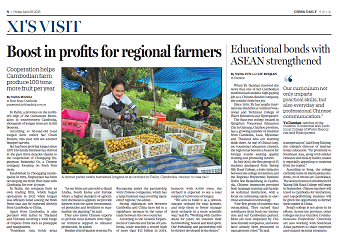More young travelers opt for chills over thrills
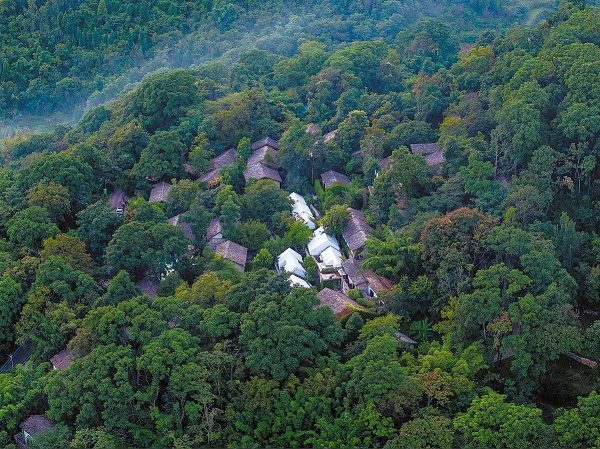
JiangLu Cunxiao hotel near Huangguoshu Waterfall in Guizhou province. [Photo provided to China Daily]
With the fast-paced nature of modern life, a new trend known as "lying-flat" travel has been quietly emerging in recent years.
From July to August 2023, searches related to lying-flat travel increased by 50 percent compared to the previous year, with travel guides and notes up by 70 percent, according to data from online platforms Meituan and Dianping.
Over 70 percent of the searchers were young people under the age of 30.
"For those dealing with societal pressures and mental exhaustion, lying-flat travel offers a great way to adjust by focusing on slowing down, deeply relaxing, and finding a sense of inner peace during the journey," said Han Yuanjun, an associate researcher at the China Tourism Academy.
Compared with adventure tourism or high-intensity hiking, many young travelers now prefer vacations that offer mental and physical relaxation, Han said. Experiences like riding escalators up mountains align perfectly with their desire for "easy, no pressure" travel, Han added.
Destination nowhere
Li Yu, 30, is a good example of the swing to low-intensity travel. Originally from Anshun, Guizhou province, and with roots in Shenzhen, Guangdong province, Li spent years working in hotel marketing communications, and was constantly on the move. Over time, her idea of a perfect vacation changed dramatically due to her work experiences.
"Instead of the usual adventure-filled trips, I found myself increasingly drawn to the idea of 'staycations' — trips that focus on relaxation, comfort, and minimal effort," said Li.
As part of her job, she had explored countless hotels and resorts, often reviewing new properties, highlighting their features, and marketing them to potential guests.
However, it wasn't until she visited a boutique guesthouse in her hometown, that she understood the appeal of staying put and immersing herself in a place, rather than rushing to experience all the nearby attractions.
"This guesthouse, perched on a cliffside with stunning views of Karst mountains, sparked my curiosity about how the space itself could become a destination, not just the surrounding attractions," said Li.
Her first staycation in a hotel was triggered by the impact of the pandemic, which inspired her to take a break from her hectic life. For two years, Li traveled to 50 cities and two countries, seeking out hotels and resorts where she could truly relax.
"Instead of trekking through popular tourist destinations, I focused on finding unique places to stay — places that offered quietude and a chance to disconnect from the pressures of work and daily life," said Li, who still earns an income from marketing work.
One of her memorable experiences was in Xishuangbanna, Yunnan province, where she stumbled upon a local bar that became her evening retreat.
"The atmosphere was laid-back, with locals enjoying the night over drinks and casual conversations. I soon realized that this was exactly what I needed in my travels — moments of connection, relaxation, and no sense of urgency," she said.
Li's experiences changed her view on what makes a trip worthwhile. Whether in the charming city of Quanzhou in Fujian province where a local mother and daughter took her to a hidden restaurant, or in Laos, where she decided on the spot to take a train ride to Luang Prabang, Li discovered that the joy of travel came from slowing down and letting the journey unfold naturally.
"By focusing on the comforts and details of the places I stayed — be it the thoughtful design of boutique hotels or the tranquillity of a mountain retreat — I gained a deeper connection to the culture and environment around me," said Li.
No reservations
The 2024 China Youth Consumption Trends Report by Beijing News revealed that over 70 percent of respondents travel at least once a year, with 46.36 percent making multiple journeys annually. More than 40 percent of the respondents spent over 5,000 yuan ($688) per year on travel.
Young people are increasingly willing to pay for high-quality travel experiences and place greater emphasis on the journey itself as well as its emotional and intellectual rewards, the report said.
For the younger generation, hotels are not just places to sleep, but central to lying-flat travel.
Yi Lin, a 32-year-old executive based in Beijing and Hangzhou, Zhejiang province, has been traveling for a decade and has visited more than 10 countries. In recent years, she has prioritized relaxation over sightseeing, and comfort over crowds.
For her, a vacation is not about rushing from one landmark to another, but instead immersing herself in the world of a beautifully designed hotel. "I realized that a hotel can be more than just a place to sleep — it can be the destination itself," said Yi.
She carefully selects hotels that offer striking architecture, cultural elements, and premium hospitality.
"A good hotel is like a museum. In Mexico, I stayed at a vibrant, artist-filled resort where local painters and dancers showcased their work. In Oman, my beachside retreat offered meditation and yoga by the sea. Each place told a different story," said Yi.
Some might argue that staying in a hotel rather than exploring its surroundings is a waste of a trip, but Yi disagrees. "Unless there's an attraction that truly interests me, I don't feel guilty about not going out. Travel, for me, is about mental relaxation rather than physical movement," she said.
One of Yi's most unforgettable experiences was in Cancun, Mexico, in 2018, at an exclusive "resort island", one of only three in the world run by a French designer. The hotel provided a truly immersive experience, with rooms that opened up to private pools, which led to larger pools and then directly to the beach.
"I might explore a city for a day or two, but I'll always save time for a great hotel. That's where I truly unwind. At the end of the day, a perfect trip is one where you feel refreshed, inspired, and completely at ease," said Yi.
The Munya Homestay Consumer Report released last year, highlighted a significant shift in consumer behavior, from a brief and superficial travel experience to one focused on deep immersion and relaxation.
The report revealed that the average stay per person has risen to 1.6 days, with 37 percent of travelers opting for stays of two days or more, reflecting a growing demand for more meaningful travel experiences.
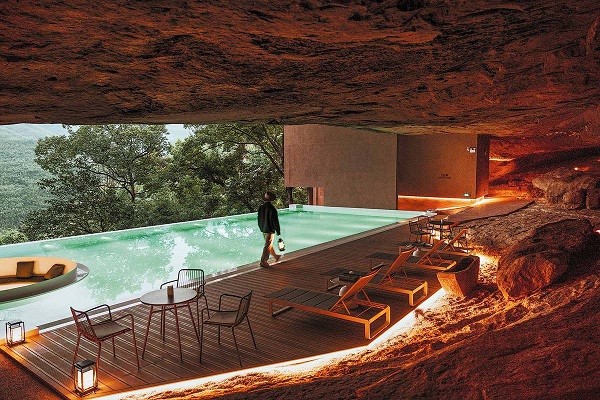
JiangLu Yalugu in Chishui, Guizhou, is an example of "destination hotels" that offer more than just a place to stay. [Photo provided to China Daily]
Resorting to this
Established in June 2016, JiangLu hotels are a prime example of "destination hotels" that offer more than just a place to stay. "JiangLu is trying to reshape the way travelers experience local culture, combining luxurious accommodation with authentic, immersive experiences that cater to the rising demand for deeper travel," said Zhang Hong, chairman of the hotel chain.
The company's boutique vacation homes and resorts focus on providing serene, "hidden" luxury experiences in China's scenic regions.
Zhang's aim is to preserve and celebrate the cultural heritage of China's rural areas, particularly in Yunnan and Guizhou provinces, where centuries-old villages are disappearing due to urbanization.
In 2020, JiangLu opened a hotel located in a cave in Chishui, Guizhou. Surrounded by bamboo forests, JiangLu Yalugu was transformed from a small village of 11 families, and has been adapted to the landscape to accentuate the features of the surrounding environment.
"The acquired knowledge of these villages, in terms of their architecture, crafts, and intangible cultural heritage, is at risk of being lost forever. Our mission at JiangLu is to not only protect these legacies but also to bring them to life in ways that people can connect with," said Zhang.
JiangLu creates immersive experiences where the guests become part of the local culture, truly experiencing the traditions and values of the region.
One of the standout locations, JiangLu Cunxiao near Huangguoshu Waterfall, Anshun, Guizhou, is a perfect embodiment of this ethos. The property blends the traditional architectural style of the local Bouyei people with modern aesthetics, creating a space that feels both timeless and contemporary.
"It's about honoring the past while embracing the future. Our aim is to preserve the cultural essence of these places and share them with our guests in a way that is both meaningful and respectful," said Zhang.
The hotel group wants to create "slow travel" experiences that allow guests to escape the chaos of daily life, and immerse themselves in a slower, more mindful rhythm, he said.
Guests can participate in workshops on ancient techniques like Bouyei wax dyeing or join elders to learn traditional songs and dances.
The hotel group also aims to be a model of sustainability, both environmentally and culturally. "By supporting local artisans and using sustainable materials, we're not just preserving culture; we're helping these villages thrive," said Zhang.
With over nine operational locations and six more under construction, the company is quickly becoming a beacon of cultural tourism in China. Zhang has plans to expand JiangLu's reach both in China and internationally.
All in the family
Many young families are also now adopting lying-flat travel to relax and unwind on their vacations.
Cheng Yi, a 36-year-old company employee from Ningbo, Zhejiang, has significantly changed her approach to vacations since her 4-year-old daughter was born.
"Before we had our daughter, we were travel enthusiasts, always on the move, seeing the sights and checking off cities and countries. But once she arrived, everything changed," said Cheng.
In the past, the couple prioritized sightseeing and adventurous excursions. But now their vacations focus more on spending quality time together in hotels that offer comprehensive services and family-friendly amenities.
"I used to think of staycation-style vacations as a waste of time, but now they feel like a natural fit for our family lifestyle," said Cheng.
Now, Cheng and her family gravitate toward resorts or hotels designed with children in mind, where everything they need is on hand. She said the biggest appeal is the opportunity to truly relax and spend meaningful time with her daughter.
"We prefer a resort where everything is taken care of — activities, food, and relaxation. It's a one-stop-shop that makes life easier. We can just unwind without the pressure to go out and see everything. It's about being together, being present," said Cheng.
Looking ahead, Cheng hopes to see the hotel industry adapt further to the lying-flat trend. She would love to see more interactive and engaging experiences for families that go beyond just providing a place to sleep.
One of her favorite hotels, the Changqiao Pelican Resort in Zhoushan, Zhejiang, is a good example of this, she said.
"It has a marine park, a rain forest, and a variety of attractions all in one place, making it perfect for kids and allowing our family to make the most of our stay," she said.
Cheng said while the family will continue to choose hotel staycations, they are also open to other travel ideas.
"Travel isn't about seeing how many places you can visit anymore. It's about experiencing the place you're in and soaking up the local life. It's not just about where we go, it's about the memories we make together," she said.
All rights Reserved. 京ICP备13028878号-8







 Overview
Overview Guiyang
Guiyang Guian New Area
Guian New Area Liupanshui
Liupanshui Anshun
Anshun Qianxinan
Qianxinan Qiandongnan
Qiandongnan Qiannan
Qiannan Zunyi
Zunyi Tongren
Tongren Bijie
Bijie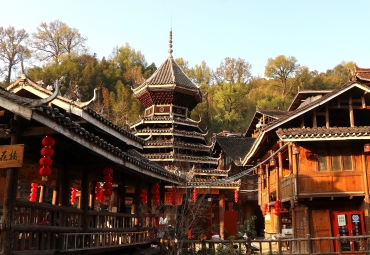 Guizhou commits to culture preservation and rural vitalization
Guizhou commits to culture preservation and rural vitalization Guizhou voice at 2025 national two sessions
Guizhou voice at 2025 national two sessions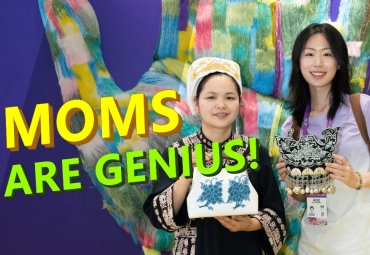 Meet the 'genius moms' at Shenzhen cultural fair
Meet the 'genius moms' at Shenzhen cultural fair 
